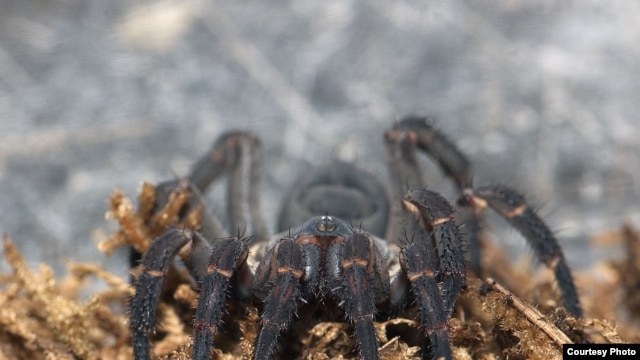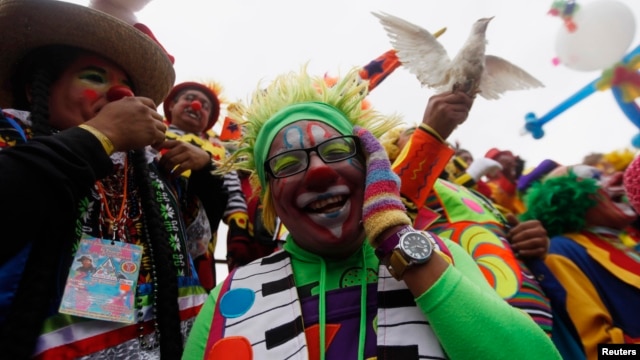What are Your Deepest, Darkest Fears? (ZT)
http://realaudio.rferl.org/voa/LERE/2014/05/08/2236485a-a7e7-43de-92f5-f756ac484115.mp3
http://learningenglish.voanews.com/content/what-are-your-deepest-darkest-fears/1910656.html
From VOA Learning English this is As It Is! I’m Anna Matteo in Washington.
“Laughter is the best medicine” is a popular expression. It simply means that laughing could be good for your health and good for your mind. But what if hearing laughter makes you afraid? Later in the show, we will hear about a fear, or phobia, of what many feel is the greatest sound on earth – laughter.
But first, we talk about fears, or phobias, in depth.
What is a phobia?
A phobia is a strong fear of something that, in reality, presents little or no danger. Most phobias develop in childhood, but they can also develop in adults. The word phobia comes from the Greek language. It means “to fear.”
Some phobias are common. The fear of spiders is arachnophobia. The fear of small spaces is called claustrophobia. And the fear of heights is acrophobia.
But there are also uncommon phobias. Somniphobia is the fear of falling asleep. And papaphobia is a fear of the leader of the Roman Catholic Church, the Pope. The list of phobias goes on and on.
Having a phobia is not a laughing matter. Phobias often create problems in a person’s life. One common phobia that can create problems and hold people back especially at school and at work is the fear of public speaking or glossophobia. “Glossa” is Greek for “tongue.” A student with glossophobia may be afraid to speak up in class. At work, a person with this phobia may not speak up in meetings.
Whether it is a phobia or a real danger, our bodies react to fear. And we often use physical expressions to describe ourselves when we are afraid. I was so scared “my blood ran cold” or I “broke out into a cold sweat.”
If a book or movie is scary, we often call it “spine-tingling” or “hair-raising.” If something scares us, we can say it “made our hair stand on end” or that it had us “shaking in our shoes.” All these expressions describe what happens to a person’s body when they are afraid.
The U.S. president Franklin Delano Roosevelt famously said in his inaugural speech that, “the only thing we have to fear is fear itself.” That is a nice idea. But try telling that to a person who is “afraid of their own shadow.”
I’m Anna Matteo. And you are listening to As It Is.
On today’s As It Is, we are learning about phobias, things that scare us. And one phobia may surprise you. It is the fear of something basic to the human condition.
Christopher Cruise brings us that story.
Fear of Being Laughed At
Imagine this situation. You pass a group of people. The people are talking to each other. You cannot hear what they are saying. But suddenly they start laughing. What would you think? Would you think they were laughing at something funny that one of them said? Or -- be honest with yourself -- would you think they were laughing at you? Yes, you.
Being laughed at is a common fear. But a major study published in 2009 found that this fear is not the same around the world. It differs from culture to culture.
People in Finland were the least likely to believe that people laughing in their presence were making fun of them. Less than ten percent of Finns in the study said they would think that, compared to eighty percent of people in Thailand.
Some people in the study said they felt unsure of themselves in social situations but hid their feelings of insecurity. Others said they avoided social situations where they had been laughed at before.
The study found that people in Turkmenistan and Cambodia were more likely to be in the first group. They would hide their feelings of insecurity if they were around other people's laughter. But people in Iraq, Egypt and Jordan were more likely to try to avoid such situations if they felt they had been laughed at before.
Shy people often avoid situations that would force them into close contact with other people. They worry that something they say or do will make other people laugh at them. But some people worry much more than others. They may have a disorder called gelotophobia. Gelos is a Greek word. It means laughter. This fear of laughter can be truly sad for those who live with it. It can affect how they lead their lives.
Another purpose of the study was to compare the levels of fear of being laughed at in different cultures. The researchers surveyed more than 22,000 people in 42 different languages.
In 2012, the same researchers published an article about gelotophobia. They wrote about how harmful gelotophobia is to mental health. The researchers compared adults living in Austria, China, and Switzerland and found that in all those places “gelotophobes” were unhappier. They also were less likely to feel engaged in their life activities, and believed that their lives had less pleasure and meaning.
Both studies appeared in the scientific journal Humor: International Journal of Humor Research.
I'm Christopher Cruise.
And I’m Anna Matteo.
To practice American English or talk about phobias, use our comment section. And if you have a phobia of not finding VOA Learning English online, have no fear. You can find us on Facebook, iTunes, LinkedIn or YouTube.
And don’t forget to join us again tomorrow for another As It Is.


